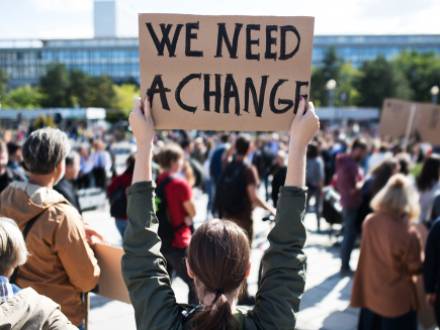When a Protest Becomes a Riot
 Heated protests are expected nationwide after the election, regardless of the election’s outcome. Especially if you are in or near a major city like Chicago, IL, you are likely to encounter political protestors. Everyone has a constitutional right to free speech, and political speech in particular is heavily protected. However, there are time, place, and manner restrictions on protestors. There is sometimes a fine line between a protected political protest and an unlawful riot. If protestors begin to conduct themselves in a violent manner that causes public alarm, they could be charged with crimes, like looting, disorderly conduct, assault, or obstructing the police. A protest that was meant to be peaceful can quickly turn into a riot when the situation becomes heated. If you are charged with an offense related to a protest, you need an experienced Will County, IL criminal defense lawyer.
Heated protests are expected nationwide after the election, regardless of the election’s outcome. Especially if you are in or near a major city like Chicago, IL, you are likely to encounter political protestors. Everyone has a constitutional right to free speech, and political speech in particular is heavily protected. However, there are time, place, and manner restrictions on protestors. There is sometimes a fine line between a protected political protest and an unlawful riot. If protestors begin to conduct themselves in a violent manner that causes public alarm, they could be charged with crimes, like looting, disorderly conduct, assault, or obstructing the police. A protest that was meant to be peaceful can quickly turn into a riot when the situation becomes heated. If you are charged with an offense related to a protest, you need an experienced Will County, IL criminal defense lawyer.
Understanding Illinois’s Public Protest Laws
Illinois has several different statutes addressing riots and other forms of mob action. Property damage is often a large component of riots. Types of conduct during protests charges include:
- Fighting or assaulting others - If your protest leads to any physical violence, however minor, you can quickly find your protest classified as a riot. For example, say your protest group encounters an opposing protest group. You directly engage with the other group and a minor brawl breaks out. This could be considered a crime, as there is a threat of harm to bystanders.
- Lighting fires - Starting fires in the streets poses an imminent risk of harm to everyone in the vicinity and can be considered an act of violence.
- Use of weapons - The use of firearms or other deadly weapons can incite public terror and alarm very quickly. Any inappropriate display of guns or dangerous weapons is likely to lead to arrests.
- Causing property damage - Smashing the windows of storefronts, damaging nearby vehicles, or destroying public property is likely to cause others around to fear imminent violence.
- Looting - Unlawfully taking property during civil unrest is the offense of looting.
- Conflict with law enforcement - Failing to follow the directions of law enforcement, obstructing police activity, or fighting with police officers can lead to charges.
- Blocking traffic - Protestors cannot impede the flow of traffic unless they have a permit to close a road.
- Trespassing - Entering private property while protesting can lead to trespassing charges.
- Disturbing the peace - While noise and annoyance to bystanders are expected, creating a serious disturbance that causes others to fear for their safety or impedes public use of public property can lead to arrests.
Contact a Will County, IL Criminal Defense Attorney
Law Offices of Jack L. Zaremba, P.C. is committed to protecting the constitutional rights of our clients. Our experienced Joliet, IL criminal defense attorneys will work to defend you after an arrest related to protest activity. Contact us at 815-740-4025 for a free consultation.

















